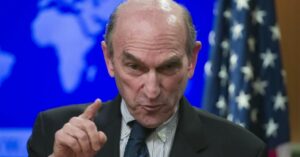(Bloomberg, Lucia Kassai and David Wethe, 10.Sep.2019) — The firing of U.S. National Security Advisor John Bolton gave oil markets some near-term supply comfort, while analysts were divided on whether the move will lead to a longer term softening in U.S. foreign policy toward Iran and Venezuela.
Brent crude oil prices fell more than 2% after President Donald Trump announced via Twitter that he’d fired Bolton, widely held as one of his more hawkish foreign policy voices. Oil production in Iran has dropped by 40% and in Venezuela by 48% since Bolton took office in April 2018.
The firing “could be a catalyst for a material de-escalation in the Iran standoff” and could bring back around 700,000 barrels a day of Iranian crude, possibly by the first quarter, Helima Croft, global head of commodity strategy for RBC Capital Markets LLC, said in a note Tuesday.
At a White House news conference following the Bolton announcement, Secretary of State Michael Pompeo and Treasury Secretary Steven Mnuchin said they remain committed to the “maximum pressure” campaign against Iran and that they are in lockstep with Trump on the issue. The administration has repeatedly stated its intention to reduce oil exports from the OPEC producer to zero.
“Secretary Pompeo is now the clear leader of the Trump national security team, and you would be hard-pressed to find a bigger hawk on both Venezuela and Iran,” Joseph McMonigle, an energy analyst for Hedgeye Research, said in a note Tuesday.
Oil prices recovered a bit from their initial drop, settling down just 21 cents for the day at $62.38 a barrel.
Eurasia Group said in an email that without Bolton — who “has been ‘Dr. No’ when it comes to talks with Iran” — there’s a better chance that Trump will meet with the Iranian president at the UN General Assembly.
Trump withdrew from a nuclear agreement between Iran and world powers in the month following Bolton’s appointment. That decision squeezed the producer’s oil exports as its leading customers shunned purchases to avoid being subject to U.S. sanctions.
America’s withdrawal also caused tensions within the Organization of Petroleum Exporting Countries, which is pursuing output curbs to prop up prices. Iran has accused fellow members including Saudi Arabia of seeking to usurp market share while its exports are under pressure.
Bolton was also seen as a vocal opponent of extending waivers for U.S. companies that continue to do business in Venezuela, as the administration tightens financial pressure on President Nicolas Maduro. Last month, the U.S. extended waivers for Chevron Corp. and several drillers doing work in that nation, where oil output has fallen from a high of 3.7 million barrels a day in 1970 to 742,000 now. The 90-day waivers currently in place are due to expire on Oct. 25.
“We remain hopeful that the license will be extended,” Ray Fohr, spokesman for San Ramon, California-based Chevron, said in an email. “If Chevron is forced to leave Venezuela, non-U.S. companies will fill the void and oil production will continue.”
On Venezuela, “Trump had become very frustrated that Bolton’s maximum pressure gambit to get rid of Maduro wasn’t bearing fruit,” according to Eurasia Group. “Special Envoy Elliott Abrams is more open to some form of compromise.”
“It’s possible but not likely that Bolton’s departure could open the door for another extension,” said David Goldwyn, a Washington-based energy consultant and former U.S. State Department special envoy under the Obama administration. “I would probably give it a 40% chance.”
Others were less optimistic on waiver extensions amid the wait for Bolton’s replacement. Trump said he would name a successor next week.
“The present position that the waiver’s going to end in two months is probably the position that will be maintained,” Russ Dallen, managing partner at consultant Caracas Capital, said in a phone interview from Miami. “The wheels are grinding that way. But it’s just going to depend on who steps up to handle that position now.”
–With assistance from Rachel Adams-Heard, Kevin Crowley and Pratish Narayanan.
To contact the reporters on this story: Lucia Kassai in Houston at lkassai@bloomberg.net;David Wethe in Houston at dwethe@bloomberg.net
To contact the editors responsible for this story: David Marino at dmarino4@bloomberg.net, Tina Davis, Pratish Narayanan
***
